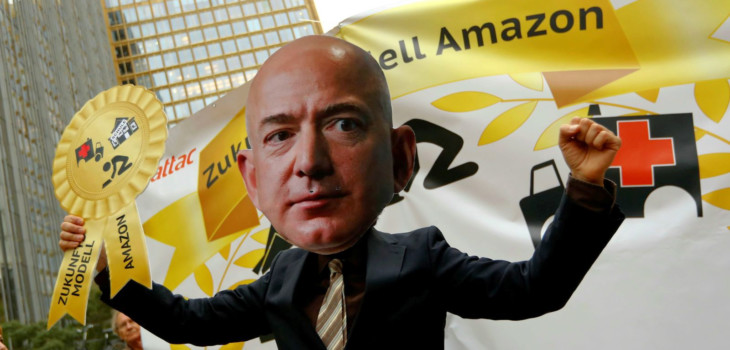Amazon: it’s more than Bezos

Last week, stock market punters in the US pushed Amazon’s share value over $1 trillion. It became just the second company, after Apple, to be valued so highly. The news capped a fine summer for founder Jeff Bezos, whom Forbes magazine had declared the world’s richest person three months earlier.
Now, we don’t need to get too excited by that trillion figure. That’s what stock market punters reckon it’s worth, and they’re prone to make mistakes.
But whichever way you look at it, Amazon is massive, with over half a million employees and revenues close to $200 billion. It dominates online shopping. Its various and increasingly creepy devices now sit in many of our homes, listening to, and possibly recording, our lives. It has bought businesses such as Wholefoods and Kiva Systems, whose robots have displaced humans doing some of the picking and packing of goods in Amazon warehouses. Even more lucrative is Amazon Web Services, which provides cloud computing to a host of corporations including Kellogg’s, Vodafone and even Amazon Prime-rival Netflix.
Also in the news this week was yet another story about how badly Amazon treats its workers. A Staffordshire warehouse employee told the BBC the company doesn’t give enough time for her and her colleagues to take toilet breaks – so they don’t drink as much water as they need.
There is a long, long list of such stories: exploitation is at the core of the business model. Over the last summer the company’s attitudes have provoked workers to go on strike in Poland, Germany, Italy and Spain (where they were met with riot police).
Blame for the company’s actions usually starts and ends with Jeff Bezos. Bernie Sanders’ current campaign against the company in the US is very much focused on him, for example.
It’s easy to see why. He founded Amazon. He is the CEO and chairman. The company’s history is intertwined with his own. As such their relationship is usually seen as comparable with those of Mark Zuckerburg with Facebook, or Sergei Brin and Larry Page with Google.
But Facebook and Google are controlled by their founders to a far greater degree than Amazon. Zuckerburg, Brin and Page have final say over the direction their companies through the amount of shares they own.*
Bezos doesn’t. He owns just 16% of Amazon. That still makes him the richest person in the world, so it’s not exactly negligible. But shareholders have the power to dictate the direction a company takes, and he doesn’t have close to a majority of shares.
A list of the company’s major shareholders after Bezos reveals the same massive investment funds – Blackrock, Fidelity and so on – that own chunks of most other big corporations. None hold more than 5% of Amazon shares. But if they teamed up they could outvote Bezos, and even sack him from his job running the company. So far they have been happy to take a back seat, to the extent that they’ve stuck with Amazon even though it has never paid them a dividend. But this may change in future – and perhaps not at a time of Bezos’ own choosing.
The truth is Bezos is by no means the only person responsible for Amazon’s long list of abuses. The company serves, and is steered by, a far greater variety of interests than just one man’s personal wealth and power. In the highly unlikely event Bezos had some kind of moral epiphany, those investment funds would still need Amazon to grow, and Bezos would be out. For all that Amazon is associated with the personal vision of its founder, it’s already become just another way for big capital to get bigger.
* In Google’s case Chairman Eric Schmidt also has a similar stake.
